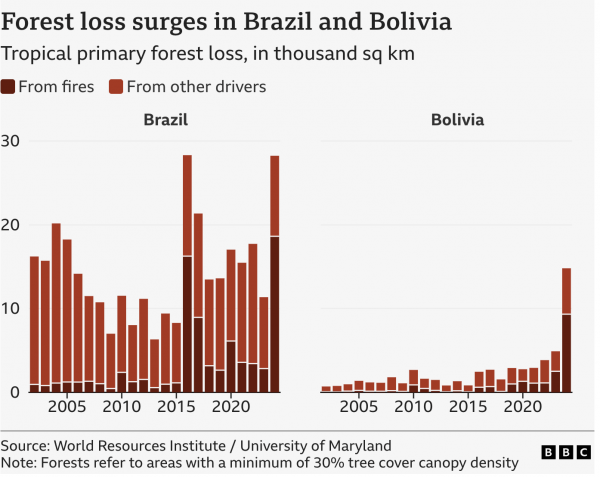UMD-GLAD Produces Data for Global Forests Report Featured in The New York Times, BBC
GEOG researchers at UMD’s Global Land Analysis and Discovery GLAD) Lab, led by Professor Matthew Hansen and Research Professor Peter Potapov, continue to shape international conversations about the planet’s most urgent environmental issues. Most recently, the work contributed to the 2024 State of the World’s Forests report published by the World Resources Institute, which garnered coverage in major news outlets including The New York Times and the BBC.
The New York Times: 'Global Forest Loss Hit a Record Last Year as Fires Raged'
The planet lost a record amount of forests last year, driven by fires that raged around the world, data shows.
Loss of pristine rainforests alone reached 6.7 million hectares in 2024, nearly twice as much as in 2023, researchers at the University of Maryland and the World Resources Institute said in an annual update of the state of the world’s forests.
The world lost the equivalent of 18 soccer fields of forested land every minute, the researchers estimated. ...
“If this trend continues, it could permanently transform critical natural areas and unleash large amounts of carbon, intensifying climate change and fueling even more extreme fires,” Peter Potapov, the co-director of the Global Land Analysis and Discovery Lab at the University of Maryland, said in a statement. ...
Researchers at the University of Maryland’s lab use satellite imagery to track changes in forest cover. The data is publicly available on the World Resources Institute’s Global Forest Watch platform. ...
The New York Times Article in Full
The BBC: 'Tropical Forests Destroyed at Fastest Recorded Rate Last Year'
The world's tropical forests, which provide a crucial buffer against climate change, disappeared faster than ever recorded last year, new satellite analysis suggests.
Researchers estimate that 67,000 sq km (26,000 sq mi) of these pristine, old-growth forests were lost in 2024 – an area nearly as large as the Republic of Ireland, or 18 football pitches a minute.
Fires were the main cause, overtaking land clearances from agriculture for the first time on record, with the Amazon faring particularly badly amid record drought. ...
Many researchers are concerned some forests, such as parts of the Amazon, may be approaching a "tipping point", beyond which they could fall into irreversible decline.
"The tipping point idea is, I think, increasingly the right one," said Prof Matthew Hansen, co-director of GLAD laboratory at the University of Maryland, which produces the data.
Prof Hansen described the new results as "frightening", and warned of the possible "savannisation" of the rainforest, where old-growth tropical forests die back and permanently switch to savanna.
"It's still a theory, but I think that that's more and more plausible looking at the data." ...
Image: Screenshot of BBC article illustration. Source: World Resources Institute / University of Maryland
Related Article
Pulling the Global Fire Alarm in Maryland Today
Published on Tue, 05/27/2025 - 11:52


